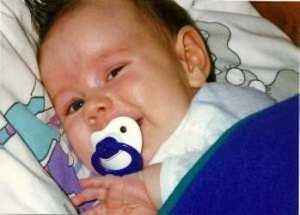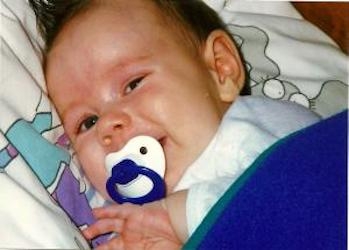Providing Comfort When a Child Dies
By: Helen Baldwin
In 1997, our two-month old baby, Jeffrey, was diagnosed with spinal muscular atrophy (SMA), a neuromuscular/motor neuron disease and leading genetic killer of children under two. He died 3-1/2 months later, but our assignment was hardly over.
Regardless of circumstances, grief is excruciating at best. The only guarantee is its unpredictability and propensity for making one wonder if itʼs possible to escape the abyss of heart-shredding despair. One baby step forward, S-L-I-D-E back, repeat... again and again. All ʻfirstsʼ are agonizing, and sometimes even ʻtwentiethsʼ can blindside those in grief.
Thereʼs no need to elaborate on the devastation of losing a child. Child death, obviously uncomfortable and rarely discussed, tends to send even family and good friends scurrying.
Input from bereaved moms might help change that.
Lindsayʼs son Emory, born in early 2008, was diagnosed at three days with Cerebro-costo-mandibular syndrome (his ribs were mostly cartilage), paired with micrognathia (recessed chin and his tongue set back); his was the 56th known case of this genetic
condition in the world. Emory remained in the hospital for one month until life support
was removed, and he passed away.
Lindsayʼs suggestions:
- Allow the bereaved to grieve as long as it takes; donʼt try to push them through it. Friends and family who recognized the magnitude of my loss were the most helpful.
- Let the bereaved explore, question, and work through what makes sense to them in the area of faith.
- Itʼs ok to not say anything; just know that I am sad, and thatʼs ok as well.
- Just because I was laughing yesterday does not mean that I am healed and over the loss of my baby.
- Hearing others mention Emory after five years comforts me more than pretending he never existed.
- Jʼs bright, outgoing 7-year old son was playing happily with a new friend when he
- became the victim of a tragic accident. While I was thankful we were ʻpreparedʼ for
- Jeffreyʼs decline, J said she was thankful her extraordinary son enjoyed life to the fullest right to the very end.
Jʼs suggestions:
- When speaking to the newly bereaved, itʼs okay to mention someone you've lost, especially a child, as it is comforting and also helps me identify those who are truly empathetic.
- It took a whole lot of grace on my part to respond kindly to frequent platitudes of 'comfort' that I questioned. However, I came to understand that most people have no idea what to say to someone who has just lost a child, and what comforts them is all that comes to mind. I'd certainly rather hear something spoken with kind intentions than be avoided.
- I often choose to be upbeat, positive, and even enthusiastic about life. That doesnʼt mean that I donʼt miss my son like crazy.
- I donʼt avoid saying my sonʼs name or bringing up memories of him when one hits me. That makes some people uncomfortable, but I donʼt want his name to become taboo out of fear it will make me sad. The sadness of losing him is as much a part of me as the freckles and moles on my body that donʼt ever go away and occasionally multiply.
- Sometimes people who donʼt know how my son died bring up horrific stories of similar accidents and feel awkward when they learn my story. If this happens, acknowledge that you just learned about the circumstances, then sincerely express your sympathy.
- In summary, some key elements of easing the grief journey: allow those grieving ample time and space (grief doesnʼt follow a playbook!), remember and mention the child, donʼt presume the individual is ʻover itʼ because life seems good. Iʼd like to add just listen, as talking - and rambling - for the bereaved is extremely cathartic. And so are hugs and tears!
- After Jeffreyʼs diagnosis and death, I relied on family, faith, and connections to other SMA families (primarily online) to stay upright. Some years later, I met Kaaren Hayes with Parent-to-Parent Family Support Network, a wonderful network for families faced with myriad ʻspecialʻ circumstances. Teresa Emory, Outreach Coordinator for Mitchell and Yancey counties, helps lead a Compassionate Friends group, and there are also Supporting Families who have also lost a child who are a part of the program willing to talk one to one with anyone looking for the support and comfort of someone who truly understands.
- Above all, donʼt walk the other way when you see someone who has recently lost a child - youʼll be noticed! Instead, kindly say hello and that youʼve been thinking about them, or just have a general conversation. I found that for the first month, there was so much support... then it was like I had the plague, and my sonʼs name was avoided around me at all costs. I feel special warmth toward those who still mention him.
In summary, some key elements of easing the grief journey: allow those grieving ample time and space (grief doesnʼt follow a playbook!), remember and mention the child, donʼt presume the individual is ʻover itʼ because life seems good. Iʼd like to add just listen, as talking - and rambling - for the bereaved is extremely cathartic. And so are hugs and tears!
After Jeffreyʼs diagnosis and death, I relied on family, faith, and connections to other SMA families (primarily online) to stay upright. Some years later, I met Kaaren Hayes with Parent-to-Parent Family Support Network, a wonderful network for families faced with myriad ʻspecialʻ circumstances. Teresa Emory, Outreach Coordinator for Mitchell and Yancey counties, helps lead a Compassionate Friends group, and there are also Supporting Families who have also lost a child who are a part of the program willing to talk one to one with anyone looking for the support and comfort of someone who truly understands.

